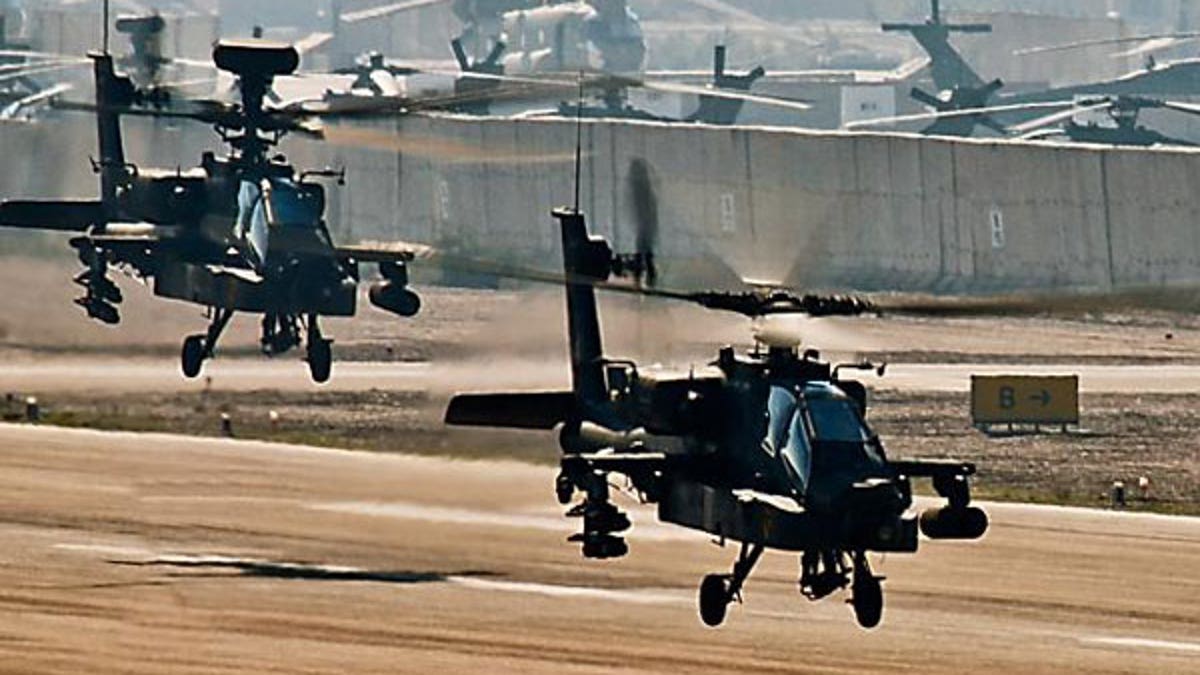
(Military.com)
NASHVILLE, Tennessee -- The Army National Guard has reluctantly begun taking steps to relinquish its fleet of AH-64 Apache helicopters to the active component, even as its leaders call for a commission to study the controversial proposal.
The Army wants to save an estimated $12 billion over several years by retiring OH-58 Kiowas and using AH-64 Apaches for the armed scout and reconnaissance mission. Because the service can't afford to buy more attack choppers to do both missions, it would transfer the Guard's entire fleet of 192 Apaches to the active component. In return, the Guard would receive 111 UH-60L Black Hawk utility helicopters from the active component.
The proposal is part of the fiscal 2015 budget request and has drawn criticism from Guard leaders and lawmakers. Still, Guard officials here at the Army Aviation Association of America's annual conference, known as Quad A, said they've already begun planning to give up the aircraft.
"The decision's been made to move forward," Brig. Gen. Michael Bobeck, special assistant to the director of the Army National Guard, said during a panel discussion on Monday. "We're working through the mechanics of implementation and execution."
In addition to Apaches, the Guard would lose 30 OH-58D Kiowa Warriors. Under the original plan, the Guard would have also given up as many as 104 UH-72 Lakotas. But that has since been revised, and the active component now plans to purchase those helicopters instead. In all, the Guard will lose 222 aircraft and get back half that amount.
"We've been through this before," said Col. Mark Weiss, chief of the Army National Guard's Aviation and Safety Division. "It's painful. It's painful whether you lose one aircraft or multiple aircraft. We're on step two of a 238-step process but we do have a plan. We will execute that plan."
Ten states will be directly affected by the so-called Aviation Restructuring Initiative, known in Army parlance as ARI. Nine states will lose Apache units, including Arizona, Idaho, Mississippi, Missouri, North Carolina, Pennsylvania, South Carolina, Texas and Utah; while Tennessee will lose a Kiowa unit, according to documents obtained by Jen Judson of Inside the Army.
The shift will create "turbulence" for the Guard, as officials seek to soften the impact to those states by transferring helicopters and personnel from other states with more aviation assets, Bobeck said.
The transfer of Apache units to the active-duty component "will cause us to restructure our assault battalions and assault units, so we'll go through a period of time to retrain our attack soldiers to utility pilots, crew chiefs, maintainers," he said.
"We'll also make some adjustments in other states not directly affected by the divestiture," he said. "We're going to move some other structure from other states -- larger Black Hawk states -- and move some of that into those nine states to try to balance that a little better."
Weiss put it another way: "We like to say we're going to spread the peanut butter a little bit."
Weiss also said the decision to implement the restructuring initiative has been made.
"What's pre-decisional is which state gets what and how much," he said. "That's the part that is the refinement piece. And there's some science and there's some art involved there."
The Guard within the past few weeks has distributed a so-called 70-percent solution to the states adjutants general and is now in the process of refining that plan, Bobeck said. The actual transfer of aircraft is slated to take place over a four-year period beginning in 2016, he said. If automatic budget cuts known as sequestration remain in effect, the Guard may be forced to turn over Lakotas, which are used extensively for such stateside missions as border patrol and national-disaster response.
Even as the Guard accepts its marching orders, leaders such as Gen. Frank Grass, chief of the National Guard Bureau, are asking lawmakers to establish a congressionally mandated panel to review the proposal.
"As we look to 2023, and with the fiscal realities we're facing, I mean, who would not want an independent look?" Grass said last month during a congressional hearing. "This committee, that's going to have to help us through this, I would think you would want an independent look, as well."
The Army's top brass, including Chief of Staff Gen. Raymond Odierno, has adamantly opposed the creation of a commission. Lt. Gen. James Barclay, deputy chief of staff for financial management, took a similar stance on Monday on the showroom floor of the conference.
"Our bottom line is, we don't need a commission," he said during a question-and-answer session.
-- Brendan McGarry can be reached at brendan.mcgarry@monster.com

